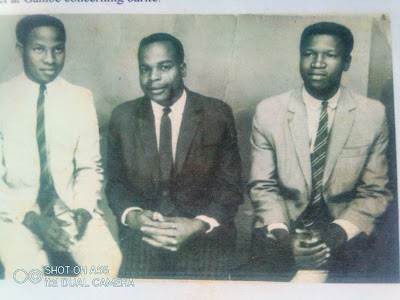THE GRAND CONSPIRACY AGAINST AREWA (NORTHERN-NIGERIA): FOREIGN MEDDLING, DOMESTIC SABOTAGE & THE WEAPONIZATION OF INSECURITY - Dahiru Yusuf Yabo
Introduction
Northern Nigeria, a historically significant region with deep cultural, religious, and political influence, is under relentless assault—not only from violent extremist groups but from a well-orchestrated web of internal and external conspiracies aimed at undermining its unity, progress, and global standing. The persistent insecurity, the rise of Boko Haram, banditry, and splinter terrorist cells across various ethno-religious backgrounds, are neither accidental nor organic; they are the byproducts of a sophisticated, well-funded campaign to destabilize Arewa by exploiting its social fabric.
International actors, including certain Western NGOs, diplomatic agencies, and strategic governmental institutions, play a dubious role in exacerbating the crisis, using humanitarian aid, human rights rhetoric, and foreign policy tools to manipulate internal dynamics. Meanwhile, some domestic figures and institutions—particularly the Christian Association of Nigeria (CAN) and elements within the so-called Middle Belt movement—have served as local conduits for this anti-Arewa agenda, fostering division and propagating misleading narratives about the North on international platforms.
At the same time, ideological extremism within some Islamic sects has contributed to the disenfranchisement of Northern political strength. Groups such as Boko Haram and certain radical Shia movements have been indoctrinated to reject democracy, viewing it as an un-Islamic system. This ideological stance discourages voter participation and political engagement, effectively weakening the North’s numerical advantage in national elections. By refusing to register, vote, or participate in governance, these sects unintentionally aid external and internal enemies in reducing the North’s electoral influence—all in the name of religious ideology, without any counter-premium to balance their self-imposed political exile.
The Manufactured Narrative Against Arewa
It is no coincidence that every major crisis in Northern Nigeria is met with a well-coordinated international media blitz, exaggerated human rights allegations, and strategic lobbying efforts in Washington, London, and Brussels. These narratives, often fronted by CAN and its affiliates, seek to present the North as a hub of religious extremism, persecution, and systemic violence against minorities, deliberately ignoring the complex realities on the ground.
The West’s fixation on this false portrayal is not born out of genuine humanitarian concerns but rather geopolitical and economic interests. The North's vast mineral wealth, agricultural potential, and strategic location make it a region of immense global significance. However, for it to be effectively exploited by external forces, its traditional structures—rooted in religious, political, and cultural cohesion—must first be dismantled. The calculated demonization of the Fulani, the systematic fragmentation of Hausa-Fulani identity, and the active encouragement of separatist sentiments within the Middle Belt serve this precise objective.
The Role of CAN and Its Western Sponsors
The creation and sustenance of CAN as a political and ideological tool was never about promoting interfaith harmony. From its inception, CAN has functioned as an instrument of division, working tirelessly to erode the historical coexistence between Muslims and Christians in the North. Its leadership has consistently used inflammatory rhetoric, aligning itself with foreign interests hostile to the North’s unity.
At every turn, CAN amplifies and exports narratives that paint the North as oppressive, repressive, and deserving of foreign intervention. Whether through lobbying the U.S. Congress, manipulating reports from agencies like USAID, or feeding Western media outlets with half-truths and outright fabrications, CAN has played an undeniable role in the global effort to delegitimize Northern leadership and destabilize the region.
The Weaponization of Religious Extremism Against the North
While external actors manipulate Northern Nigeria’s security and political landscape, internal religious extremism also plays a significant role in disenfranchising the region. Groups like Boko Haram have waged war against democracy, actively discouraging Muslim participation in elections by falsely framing it as an anti-Islamic practice. Similarly, certain Shia sects have maintained a stance of political non-cooperation, refusing to integrate into the democratic process, thereby reducing the voting strength of the North in critical elections.
This ideological deviation has direct political consequences. While other regions of Nigeria actively mobilize to maximize their electoral power, sections of the North remain underrepresented, not due to suppression by external forces, but because of self-imposed disenfranchisement. This has allowed anti-Arewa forces to push their narratives and elect leaders who do not reflect Northern interests.
Federal Government Policy Drift Against the North
Another pressing issue is the systematic policy bias against the North, despite the fact that Northern leaders have historically governed with a nationalistic perspective, ensuring the equitable distribution of resources across Nigeria.
Past leaders from Northern Nigeria—such as Ahmadu Bello, Yakubu Gowon, Shehu Shagari, Murtala Mohammed, Umaru Yar’Adua, and even military leaders like Sani Abacha—developed infrastructure, industries, and policies that benefited the entire country, particularly the South. From the Lagos-Ibadan Expressway to major ports, energy investments, and financial institutions, these projects were pursued with a nationalistic spirit rather than a regional agenda.
Yet, in contrast, contemporary economic policies have consistently marginalized the North. Key industries such as agriculture, manufacturing, and solid minerals, which are crucial to Northern Nigeria’s economic strength, receive far less federal attention and funding compared to sectors that primarily benefit the South. Federal infrastructure projects in the North lag behind those in the South, and the region’s economic potential remains largely untapped due to deliberate policy neglect.
This economic marginalization serves the broader objective of weakening Arewa. A politically strong but economically weakened North remains vulnerable to external influence, ensuring that its leaders remain dependent on the same forces that seek to control it.
The Assassination of Northern Leaders: A Pattern of Sabotage
The North has paid a heavy price for its strategic importance and unwavering resilience. Its political and military leadership has been systematically targeted, with assassinations, suspicious deaths, and orchestrated removals forming a clear pattern of elite elimination.
From Sir Ahmadu Bello to Tafawa Balewa, from Murtala Mohammed to Sani Abacha and Umaru Yar’Adua, every era of strong Northern leadership has been met with lethal resistance from within and outside Nigeria. These eliminations are not coincidental but part of a broader scheme to weaken Arewa’s ability to defend itself, assert its influence, and protect its interests in a nation where it constitutes the backbone of political and economic stability.
The Future of Arewa: A Call for Strategic Resistance
Despite decades of subjugation, infiltration, and betrayal, the North remains resilient. However, resilience alone is no longer enough. Arewa must now transition from a defensive posture to a strategic counter-offensive.
1. Intellectual and Strategic Mobilization – It is imperative to counter false narratives with robust, well-researched, and internationally recognized documentation of the real issues affecting Northern Nigeria.
2. Economic Self-Sufficiency – The North must break free from dependency on external actors by prioritizing internal industrialization, agricultural modernization, and self-sustained development.
3. Security Consolidation – The era of treating security threats with hesitation must end. Full-scale operations against banditry, terrorism, and subversive groups—without pandering to foreign criticism—must become the standard approach.
4. Diplomatic Counteraction – The North must engage international platforms not as victims but as assertive stakeholders in global discourse, directly confronting false reports, misleading statistics, and foreign manipulation.
5. Unity Above All – The engineered divisions within Arewa must be systematically dismantled. Regardless of religious or ethnic differences, the North must prioritize collective identity and reject all externally-imposed fragmentations.
Conclusion
Northern Nigeria stands at a crossroads: either it succumbs to the relentless onslaught of foreign exploitation and internal betrayal, or it rises to reclaim its rightful place as the powerhouse of Nigeria and the African continent. The enemies of Arewa—both within and outside—must be exposed, confronted, and decisively neutralized.
For how long will a vast, resource-rich, historically rooted, and culturally diverse region like the North remain under siege? The time for passive endurance is over; the era of strategic counteraction has begun.
My Warm Regards
Dahiru Yusuf Yabo
PGD-CMPC, MCM & MPPA (BUK)
Political &Security Analyst
Sunday 23rd March, 2025






Comments
Post a Comment
Northern Nigeria Perspective is welcoming all comments, observations or views. The use of foul/vulgar language, pornographic materials and such other inappropriate comments are not allowed